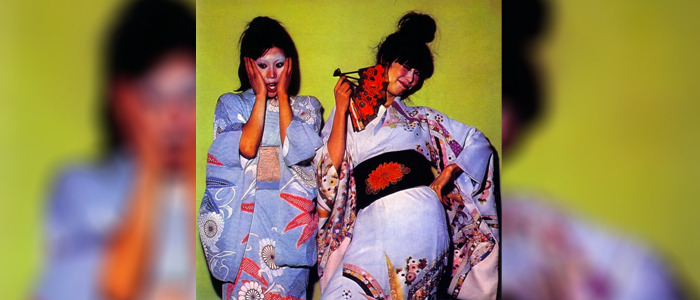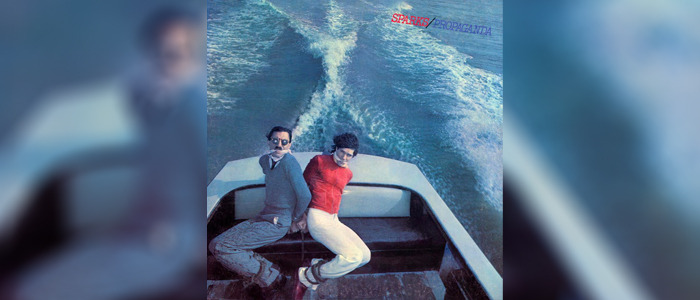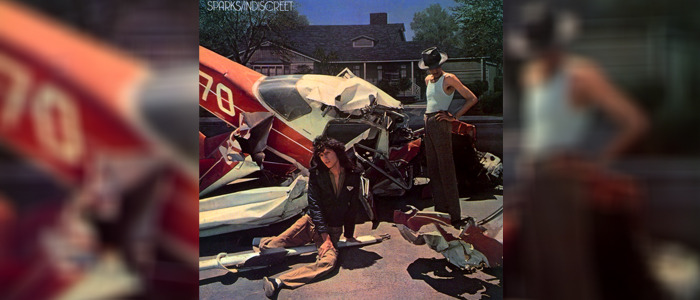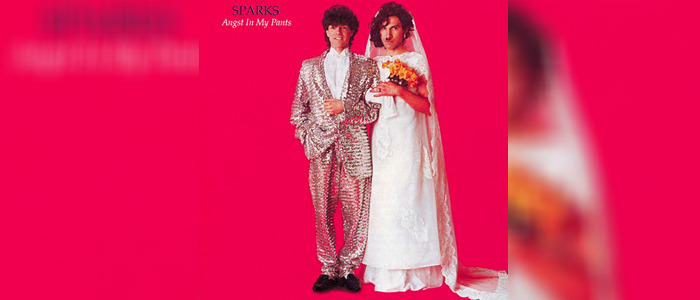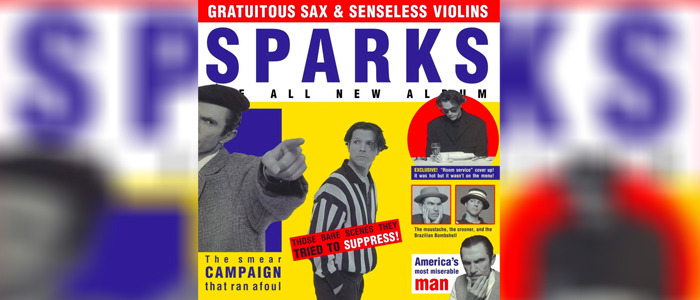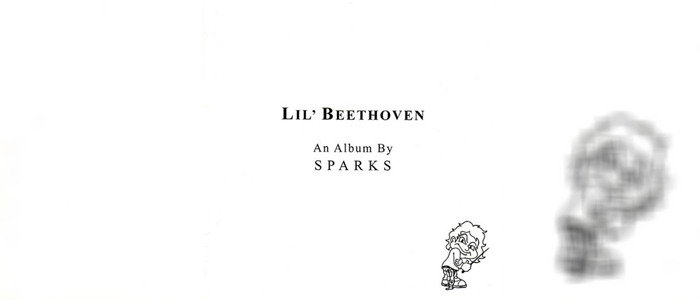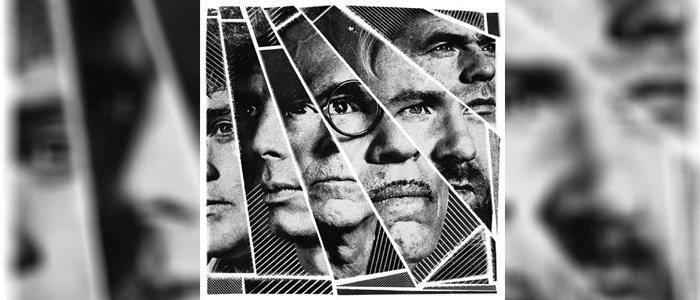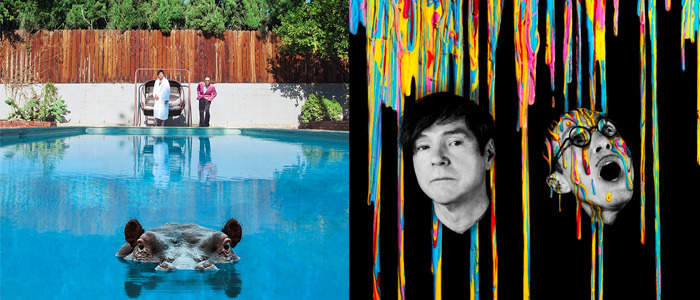'The Sparks Brothers' Director Edgar Wright's Top 10 Sparks Albums – Mostly In His Own Words
"The tricky thing with Sparks is that – and this is a good thing about the band – there's no one album that tells you the whole story."
That's Edgar Wright, the director of the new documentary The Sparks Brothers, explaining why any list of Sparks music on the Internet is only going to scratch the surface of this enigmatic, massively influential band that mainstream music lovers have probably never heard of. But in support of his new film, which details the unlikely 50-year-and-counting journey of Sparks (comprised of brothers Ron and Russell Mael), we had an extended conversation with Wright about his 10 favorite Sparks albums and why they – ahem – struck a chord with him.
Just so we're all on the same page, take a look at the trailer above to familiarize yourselves with this eccentric and wildly creative band. Better yet: check out the full documentary, which is out today. The film is a terrific ode to this eclectic group, who are a dynamic duo that spent decades innovating new sounds and pushing the envelope across multiple genres of music, all while remaining relatively under the radar.
Hopefully this documentary will introduce them to a whole new audience, and as part of that introduction, here are Edgar Wright's Top 10 Sparks albums in chronological order. And mostly in Wright's own words.
Kimono My House (1974)
Wright's first pick is the band's third album, which he refers to as a "breakthrough" for Sparks after their first two albums failed to connect. The group disbanded their American line-up and the Mael brothers took an offer from Island Records in London to make a new album in the U.K.
"I don't know what kind of pressure they were under to deliver but the album is just an absolute classic," Wright says. "It can stand toe to toe with any other rock album of that period. This might be too contentious to say, and I'm a big Queen fan, but I think Kimono My House, pound for pound, track for track, is better than any sole Queen album...I think Kimono My House is like one of those [albums], not dissimilar to something like David Bowie's Ziggy Stardust, where every track is killer."
Wright speculates that the "ferocity" of this album resulted from the band capitalizing on this opportunity, snatching a lifeline to make a new album at a point where their musical careers were hanging in the balance. "It's so energetic, it's so in your face, it's so full of ideas and it's funny and it's profound and the subject matter of the songs is really unique for a rock band," Wright says.
Standout Tracks: "There's a song called 'Here in Heaven,' which is about the idea that if Romeo and Juliet had had a suicide pact and Juliet had not gone through with her part of the bargain. So Romeo is in heaven feeling stood up, his girlfriend didn't go through with her part of the bargain, and he feels like an idiot in heaven. And so, obviously by the title you see the song 'Here in Heaven' you think, 'Oh, it must be like a romantic ballad,' but no, it's about somebody being stood up in heaven."
"It also features their first proper hit single, which is 'This Town Ain't Big Enough For The Both of Us.' And usually, when an album starts with the most famous track, you think that maybe it starts on a high and goes downhill. But the amazing thing about Kimono My House is it manages to maintain that energy throughout the rest of the songs. And I wouldn't be able to pick a standout track from this album. I just say listen to the whole thing."
Propaganda (1974)
"Amazingly, Propaganda was released in the same year as Kimono My House," Wright points out. "Kimono My House came out in spring 1974 and Propaganda came out in autumn 1974. By today's standards, the idea of knocking out two really great separate albums in the same year just seems impossible, unless you're Australia's King Gizzard and the Lizard Wizard who released five albums in a year."
"A lot of Sparks fans have the conversation about which one's better, Kimono My House or Propaganda. And my feeling is, why choose? Propaganda is a very close second to Kimono My House only coming six months later. And maybe ever so slightly overshadowed by the other album. But it's also just brimming with incredible ideas, and the sound with the British band is so powerful and fun. And it also has my favorite album cover of the entire Sparks canon, and that's saying something, which is Ron and Russell tied up on the back of a speed boat about to be thrown into the water."
Standout Tracks: The filmmaker's favorite tracks from this album include "Something For The Girl With Everything," which he describes as a track that "seems to be like a really Pell Mell rock song, but then when you start to analyze the lyrics it's like, 'Oh, this girl is blackmailing him and he has to buy her whatever she wants to shut her up.'"
"There's a song called 'Bon Voyage,' which is from the point of view of the animals that don't make it onto Noah's Ark, which is another great subject for a song. It's like the animals that are left behind to die saying goodbye to the two that made it onto the Ark. It's a really extraordinary album and it's just jam-packed with great idiosyncratic rock songs."
Indiscreet (1975)
Wright calls this album "something to obsess about." It was divisive at the time of release, and the director understands why. "It isn't what I would call an easy listen," Wright says. "You have to work with it. And that's something that maybe sometimes has held Sparks back from being as stratospheric a success as Queen, but that doesn't mean it's any lesser. If anything, Indiscreet just has more to talk about. And everything in it is so beautifully done by Ron and Russell and producer Tony Visconti."
"This is the third in a row of Island Records, so they had a really great period here. Indiscreet is the first time that Sparks really start to switch it up and maybe to the consternation of some of their British band members, but Indiscreet is more of an attempt to do like a Sgt. Pepper's style album where the choice of genres within the album is very diverse. There were some artists in the '70s, like Marc Bolan and T. Rex, who couldn't really change their sound – they kept going with the same thing. And I think the smarter artists had the bravery to switch it up, like David Bowie, and Sparks would do a similar thing on Indiscreet where they dispense with the glam, operatic rock sound of Kimono My House and Propaganda and just tackle lots of different genres. There's a little...it feels like a drawing room, comedy chamber orchestra piece, there's '20s big band pastiche. There's a futuristic stumper with synths on it. There's a song with, like, a marching band. So, it's one of those things where they just let their imagination run riot and it's probably a case that they maybe lost a few fans along the way."
Standout Tracks: "There's an incredible song called 'Tits' which sounds like it might be a sexy song, but is more like a short Harold Pinter play as a rock song. It's a song about a guy drunkenly bemoaning to a fellow barfly about the fact that his wife uses her titular tits to breastfeed their son. This situation is complicated further by the suspicion that the narrator's drinking partner is having an affair with his wife. It's dark and fucked up, but still funny and gloriously melodic."
No. 1 in Heaven (1979)
Wright's next pick was another divisive entry upon release – one that even "was considered by some as a betrayal, but is now one of the best loved albums." No. 1 in Heaven saw the group team with producer Giorgio Moroder to "basically ditch the rock act completely and [become] sort of the first band doing a full synth album as a band, before the '80s. It was a quite extraordinary thing to do and quite a bold thing to just throw yourself at this idea with abandon, and the resulting album is just amazing."
Standout Tracks: "I think anybody who has not heard this, when they listen to it, it sounds very familiar because so many people took influence from it, from Depeche Mode and Duran Duran right through to more recently with LCD Soundsystem. I think there's some songs, like 'Tryouts For The Human Race,' which sounded like a proto-LCD Soundsystem song. It's an amazing listen and it's one that I return to frequently. And I'm also very fond of it because it's my first era of Sparks that I remember."
Angst in My Pants (1982)
In Wright's estimation, Angst in My Pants is "the zenith of [Sparks'] new wave phase." It's an album that might be considered the Sparks album for many listeners in the United States, but since it didn't make waves in the U.K., Wright himself didn't come to it until recently. "When I did listen to it, I was like, 'Wow, this sounds amazing!'," he says. "Because again, it doesn't have a duff track on it, and it's delivered with such energy and brio, it's just an incredible listen right from the start with the title track."
Standout Tracks: "There are so many bangers on this one. 'Sherlock Holmes.' 'Eaten By The Monster Of Love.' 'I Predict.' My particular favorite, 'Sextown USA,' does exactly what it says on the tin. The idea of a town where everybody's having rampant sex and people who are celibate are going to be thrown in the local asylum, as it says in the lyrics." ("If you try to come here and you try to abstain, they'll send you to the prison for the criminally insane.")
Gratuitous Sax and Senseless Violins (1994)
As explored in the documentary, Sparks took a long break from making music because the band was convinced they would be able to create the music for a film called Mai the Psychic Girl that Tim Burton was attached to direct. Heartbreakingly, that project eventually fell apart, which led to the band creating a "comeback album" in 1994 – one that saw them "reclaim a sound that others had had great success with."
"In the years between No. 1 in Heaven and Gratuitous Sax and Senseless Violins, they'd inspired a lot of bands," Wright explains. "And a lot of those bands were still going, like Vince Clarke went from Depeche Mode to Yazoo, and then, Erasure. The Pet Shop Boys, whilst they won't admit it, clearly have some influence from Sparks. [laughs] So, when Ron and Russell returned to Europe with this album, some accused them of ripping off The Pet Shop Boys and Erasure, which I think was probably a little galling for them."
Standout Tracks: Wright specifically points to "When Do I Get to Sing My Way?," which he calls "indisputably one of the best Sparks songs," and also highlights "Now That I Own the BBC," and "a great song called 'Let's Go Surfing,' which Russell Mael always thinks is the great lost Sparks single."
Lil' Beethoven (2002)
In 2002, the band released Lil' Beethoven, which Wright views as the point at which "Sparks entered a third phase in their career and really paved the way for what they are now." He calls it "a really extraordinary album because they break down what they do into repeated chants. It takes away the rock aspects of it for the most part and also takes away the electronic beats. And so, it almost becomes like a neo-classical opera in a way, but it's also a really funny album because they take little observations about life and make them into songs. I almost think it's like listening to the operatic equivalent of Curb Your Enthusiasm. [Laughs] But it's an incredible listen. And it really is just an extraordinary piece of work."
"The fact that they came back out of nowhere with this album [following a couple of albums that didn't perform so well] I think got them the respect of music critics and their peers forever, really. And it also showed people that they were here to stay, that they weren't a '70s band and they weren't an '80s band, they're still an active unit and they're making new albums as good as anything they did in the '70s."
Standout Tracks: "'My Baby's Taking Me Home' is an extraordinary song with only the title lyric repeating over 100 times by singer Russell Mael," Wright says. "The repeated lyric seems to take on deeper meaning with every utterance and the song is incredibly moving even while saying very little. It's utterly hypnotic live, too."
Hello Young Lovers (2006)
The band followed up Lil' Beethoven with Hello Young Lovers, which Wright says "comes out of the gate with such force. It's like Sparks being Sparks 200%, not least in the lead single 'Dick Around,' which is an attempt to beat Queen at their own game and succeeding."
Standout Tracks: "That first single is so strong, [but] you shouldn't overlook the rest of the album as well, which is really incredible and has some of the best Sparks songs. There's a brilliant song called 'Perfume,' where Russell sings about different women in their different perfumes and the sense memory of past relationships based entirely on fragrance, which comes up with every single rhyme for brand perfumes that you could possibly think of. And then there's a brilliant song, which I think is a lot about Sparks, called 'Waterproof,' which is a song basically saying that, 'Nothing can touch me, I'm waterproof,' which I think is their way of talking about their resilience in the business, of how to carry on in the face of indifference."
FFS (2015)
In 2015, Sparks teamed up with Franz Ferdinand to create a supergroup album called FFS. The news was first announced on April Fools Day, and Wright initially thought it might be a joke. But, he says, "The resulting album is really great and I think both for Sparks and Franz Ferdinand, it re-energized them in the sense of making great four-minute rock songs and it was two great tastes that go together. You wouldn't have thought that Alex Kapranos from Franz Ferdinand and Russell Mael from Sparks singing together would work, but it does. And it's a really, really great album and it's full of songs that would be great Sparks songs and great Franz Ferdinand songs."
Standout Tracks: "Some particular standouts include 'Johnny Delusional,' the lead single, which is very much in the Sparks canon of 'not getting the girl' songs and includes the classic lyric, 'Some may find me borderline attractive from afar, but afar is not where I can stay and there you are.' My other favorite song on FFS is 'Piss Off,' which is a great bad mood song. So, if you want to tell everybody in the world to go fuck themselves, you need to start blasting 'Piss Off' in the car immediately after a meeting or as soon as you get home. That's my tip."
Hippopotamus (2017)/A Steady Drip, Drip, Drip (2020)
"I'll cheat on the last one because I think the last two Sparks albums are as good as anything they've ever done," Wright says. "After FFS, I think they fell in love with the idea of making pop songs again. Something I find extraordinary about Sparks is that they never think that writing three-minute pop songs is beneath them. It's still like a pursuit that they consider high art. And I'm always really in awe that two men in their 70s would actually be able to write pop songs and get away with them. That's what's amazing: they're not embarrassing, they don't make songs thinking, 'Oh God, I can't believe these guys are singing this.' They manage to take subject matter and make it into just perfect pop.
Standout Tracks: "There's a great song on Hippopotamus called, 'Edith Piaf (Said It Better Than Me),' which is basically saying, 'I don't have anything to regret. Even if I wanted to, my life is boring.' So, it's an anthem for the boring person who doesn't have enough in their life to regret. And then, another great song on Hippopotamus is the song 'Missionary Position,' which does exactly what it says on the tin and writes a big rock power anthem for the missionary position. Nobody's ever written a song about vanilla sex. And Ron Mael describes it as an anthem extolling the virtues of something that nobody is against so you can't argue with that."
"And then A Steady Drip, Drip, Drip from last year has several songs on it that are just classic Sparks immediately. The first time I heard the song 'Self-Effacing,' a song about being modest – an energetic, upbeat song about being modest – I'm thinking, 'that is a classic Sparks song.' They just tackle all these subject matters that nobody else would. So, I think if you wanted to really dive in, you can't really go wrong with the 10/11 albums that I just read out."
***
One of my biggest takeaways from the Sparks Brothers documentary was being inspired at how, over the course of a 50 year career, Ron and Russell Mael simply refused to be pigeonholed into being artists who were only known for one type of music. They're honest-to-God innovators, people who are driven by a pure creative instinct to go where no one else has gone before.
"When you're breaking ground like that, it is like plowing a lonely furrow," Wright says. "And in Sparks' case, sometimes they're not seeing the rewards of their work until years later." Here's hoping The Sparks Brothers finally gives this innovative, eclectic band the attention they've long deserved.
The Sparks Brothers is in theaters now.

